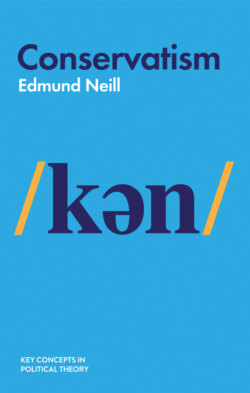Conservatism

Реклама. ООО «ЛитРес», ИНН: 7719571260.
Оглавление
Edmund Neill. Conservatism
Table of Contents
Guide
Pages
Series Title. Key Concepts in Political Theory
Conservatism
Copyright Page
Acknowledgements
1 Defining Conservatism
The Challenge of Defining Conservatism
Defining Conservatism: One Key Concept?
Defining Conservatism: Historical Approaches. Samuel Huntington: ‘dispositional’ conservatism
Michael Oakeshott and Ian Gilmour: ‘traditionalist’ approaches to defining conservatism
Karl Mannheim: conservatism and traditionalism
Michael Freeden’s Approach to Political Ideologies
Plan for the Book
Notes
2 Conservatism from the French Revolution to 1848. The Challenge of the Enlightenment, Industrialization and the French Revolution
Conservatism in Late Eighteenth- and Early Nineteenth-Century Britain
Edmund Burke
Post-1815 conservatism: ‘liberal Toryism’
Post-1815 conservatism: ‘romantic Toryism’
Conservatism in Late Eighteenth- and Early Nineteenth-Century France: The Revolution and Its Aftermath
Moderate reform: Jacques Mallet du Pan
‘Theocratic conservatives’: Joseph de Maistre and Louis de Bonald
Post-1815 conservatism: Vicomte de Chateaubriand
Conservatism in the Early United States: Puritanism and Slavery
Early conservatism in the United States: Puritanism
Southern conservatism: John C. Calhoun and George Fitzhugh
Conclusion
Notes
3 Conservatism from 1848 to the First World War. New Challenges (1848–1914)
Conservative Response I: An Embrace of the Market
Conservative Response II: Nationalism and Imperialism
Conservative Response III: Nostalgia, Radicalism and Pessimism
Conclusion
Notes
4 Conservatism in the Era of the Two World Wars. New Challenges: From the First World War to the 1960s
Conservative Response I: Embracing Mass Democracy – Stanley Baldwin and Michael Oakeshott
Conservative Response II: Elitist Sociology – Vilfredo Pareto
Conservative Response III: Values from the Ancient World – Leo Strauss
Conservative Response IV: Values from Christianity – T. S. Eliot and Jacques Maritain
Conservatism and Fascism
Conclusion
Notes
5 Conservatism from the 1960s to the Present. New Challenges: From Permissiveness to Populism
Conservative Response I: New Right Conservatism
New Right conservatism in Britain: Thatcherism
New Right conservatism in the USA
Conservative Response II: Traditionalism
Conservative Response III: Post-New Right Conservatism – David Willetts, John Gray, Jesse Norman
Conservative Response IV: Neo-conservatism
Conservative Response V: Conservative Populism – Saviour or Cuckoo?
Conclusion
Notes
Epilogue
Bibliography
Index
POLITY END USER LICENSE AGREEMENT
Отрывок из книги
Edmund Neill
polity
.....
First, it is an explicit ideological position, which comes into being in response to dramatic social changes, in order to combat the progressive political ideologies associated with those changes. Conservatism, in other words, is itself a modern phenomenon, since, prior to the Enlightenment and the industrial revolution, it had no raison d’être. Second, as an explicit ideological position, conservatism seeks to put forward a comprehensive alternative to the core concepts of liberal Enlightenment thought, favouring above all an emphasis on the concrete over the abstract. So, Mannheim argues, rather than stressing universality, abstract natural rights and rationalism in general, as the Enlightenment thinker does, the conservative seeks to emphasize the importance of different individual situations, the holistic nature of society, and a dynamic, historical approach to reasoning – of ‘history, life, and nation’, as he puts it. As such, the Enlightenment concept of ‘freedom’, for example, is not simply rejected by the conservative; rather, it is recast as something concrete, historically specific and only comprehensible within a wider social framework (Mannheim 1986: 107–10).
In suggesting that conservatism is best defined as an explicitly modern phenomenon that specifically emerges to combat the effects of sociological changes and progressive ideologies associated with the French Revolution, Mannheim provided a more promising definition than those who seek to identify conservatism with a backward-looking nostalgia or an adherence to a single natural, hegemonic, tradition. Moreover, his observation that conservatives have often sought to rebut progressives’ arguments by contending that their abstract concepts are better defined in concrete and historically situated terms provides a valuable insight into how conservatism operates. However, given Mannheim’s focus on conservatism’s origins, what his account lacks is a full account of how conservatism develops, and in particular of what provides it with lasting coherence as it has evolved and mutated from its beginnings in the late eighteenth century to the present.
.....